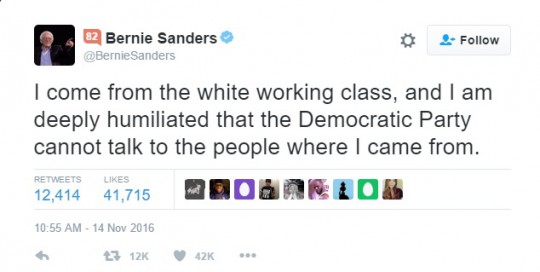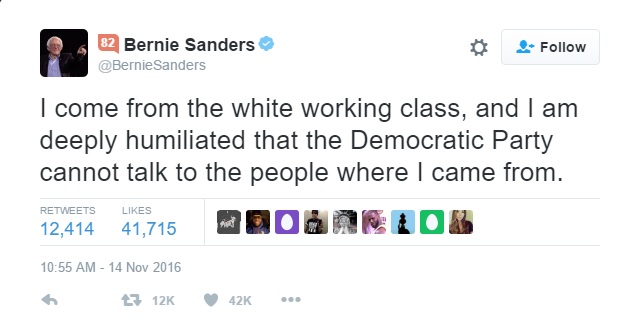 In this week’s Acton Commentary I weigh in with some reflections on the US presidential results: “Naming, Blaming, and Lessons Learned from the 2016 Election.” I focus on much of the reaction on the Democratic side, which has understandably had some soul-searching to do.
In this week’s Acton Commentary I weigh in with some reflections on the US presidential results: “Naming, Blaming, and Lessons Learned from the 2016 Election.” I focus on much of the reaction on the Democratic side, which has understandably had some soul-searching to do.
The gist of my argument is that “the New Left forgot the Old Left and got left out this election cycle.”
For further elaborations on this theme, I recommend the following: “The Real Forgotten Man Of 2016 Was Bill Clinton,” by Ben Domenech; “Rust Belt Dems broke for Trump because they thought Clinton cared more about bathrooms than jobs,” by James Hohmann; and “Bernie Sanders, In Boston: Democratic Party Needs To Focus On Working Class,” by Simón Rios.
The only coherent way forward for the Democratic Party in America is to embrace an Elizabeth Warren, Bernie Sanders-style approach to material inequality, to return the Old Labor vision of progressive politics. To paraphrase Sen. Sanders, going forward the Democratic Party has to be much more Piketty and much less RuPaul.
Winning in politics, as in sports, can make things seem like they are better than they really are. For the GOP, it could be that holding both houses of Congress and taking the White House ends up preventing the kind of reflection and reformation that really needs to happen. In that vein, I conclude the piece by pointing out that Trump’s economic message, which resonated among certain voters this time around, has its own problems and shortcomings.
White working class voters have suffered materially to some extent. The benefits of globalization and economic growth are not spread evenly, and there are some tradeoffs. The Right has largely been unwilling to acknowledge even short-term domestic losers in the global, free enterprise system.
But perhaps even more importantly than material losses, working classes have experienced suffering in a subjective and psychological sense, which includes feelings of isolation, purposelessness, and disrespect. Donald Trump became the vehicle for expressing this disaffection, while Clinton was the embodiment of a cronyist, corrupt Washington establishment.
It isn’t just the economic and material prospects for white, working-class Americans that are countertrends. The trends for these groups across a host of social measures is heading downward against the broader, more general improvement for other groups. As Gina Kolata of the New York Times reported a year ago, for instance, “Something startling is happening to middle-aged white Americans. Unlike every other age group, unlike every other racial and ethnic group, unlike their counterparts in other rich countries, death rates in this group have been rising, not falling.”
Donald Trump put forth an economic agenda designed to cater to the relative material deprivation of working-class Americans. It is largely an agenda based on a mythical past and an unrealistic future. But it was at least and in part intended to respond to the existential situation of a whole group of people who have been left behind and left out of the political and economic processes of the last two decades.
Clinton’s negligence of and Trump’s attention to the white working class may really have been the difference in this election. Politicians ought to be concerned about the working class, white or otherwise, but not fetishize it. In such a case, the GOP would become (and some certainly say it is already) just the vehicle for the identity politics of working-class rather than old, rich white men.
What we need, from our politics and from our broader culture, is a more robust and responsible populism, one that places workers and the human person within a comprehensive vision of society and significance in the world. The German economist Wilhelm Röpke characterized this as “a humane economy.”
More and better jobs are part of the solution. And here economic growth and entrepreneurial dynamism is key. But the problems are not only material. They are cultural and ultimately spiritual.
And so what we really need, and what I hope to think more deeply about in the coming weeks and months, is a proper view of the human person at the heart of this new wave of American populism.
